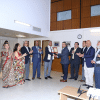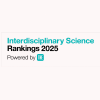IUB students' underwater vehicle shows promise for industrial applications in maritime ecology and security

A team of Computer Science and Engineering (CSE) students from Independent University, Bangladesh (IUB) has developed an innovative autonomous underwater vehicle (AUV) with significant potential for industrial applications in fisheries, maritime ecology, and maritime security. The device, created by IUB BongoMarine, has already earned recognition on the global stage, securing a spot at the prestigious Singapore Autonomous Underwater Vehicle Challenge (SAUVC) 2025.
The AUV, designed to navigate and perform complex tasks in challenging underwater environments, demonstrates versatility in applications such as fish population monitoring, underwater habitat mapping, marine debris management, maritime accident rescue operations, and naval security. These capabilities position the project as a valuable innovation for addressing critical challenges in fisheries, ecological preservation, and maritime safety. Scaling up the prototype for broader industrial use could unlock even more opportunities in these sectors.
"This device was developed after countless hours of research, prototyping, and testing," said Noor-E Sadman, the Team Director of IUB BongoMarine. "It combines advanced navigation systems, machine learning algorithms, and precise mechanical engineering to operate effectively in extreme underwater conditions. We would be proud to see if this technology can be applied in industries that are vital to our economy. If scaled up, its impact could extend even further."
The team comprises Tahfizul Hasan Zihan (Strategic and Hardware Lead), Rahat Hasan Shihab (Technical and Mechanical Lead), Md Hana Sultan Chowdhury (System Integration Lead), Mukut Protim Memo (Fabrication Lead) and Md Abdun Fattah Lam (Fabrication Co-Lead).
Their efforts were supported by IUB's Center for Industrial Automation, Robotics and Internet of Things (RIoT Research Center), which provided technical guidance. The AUV was designed and prototyped at the Fab Lab IUB, a premier engineering fabrication facility that fosters innovation through cutting-edge technology and hands-on experimentation.
IUB Vice Chancellor Prof. M Tamim, who is also a leading energy expert, lauded the team's efforts, "This project exemplifies the innovative spirit of our students and highlights how academic institutions can contribute to solving real-world challenges. The AUV has the potential to make a significant impact in industries such as fisheries management, and maritime ecology and safety. I am proud to see IUB leading this effort. Scaling up this prototype could further enhance its industrial relevance."
"It is a clear demonstration of how technical knowledge can be applied to create practical solutions," said Dr Saadia Binte Alam, Head of the Department of Computer Science and Engineering at IUB. "Our students have combined theoretical understanding with engineering skills to tackle complex underwater challenges, showcasing their potential to contribute to advanced technological development both locally and globally."
Dr Mohammad Faisal Uddin, Director of the RIoT Research Center, praised the team's achievement and underscored the potential applications of the project. "The AUV developed by BongoMarine showcases the cutting-edge research and innovation happening at IUB. It has immense potential for industrial applications, especially in critical areas like underwater habitat mapping and rescue operations."
Dr Mahady Hasan, Director of Fab Lab IUB, emphasised the lab's commitment to nurturing future innovators, saying, "At Fab Lab IUB, we empower students to turn their ideas into reality through cutting-edge prototyping and engineering solutions. The success of this AUV project stands for the talent and dedication of our students, and we are excited to see its potential impact on industry and research."


 For all latest news, follow The Daily Star's Google News channel.
For all latest news, follow The Daily Star's Google News channel. 








Comments